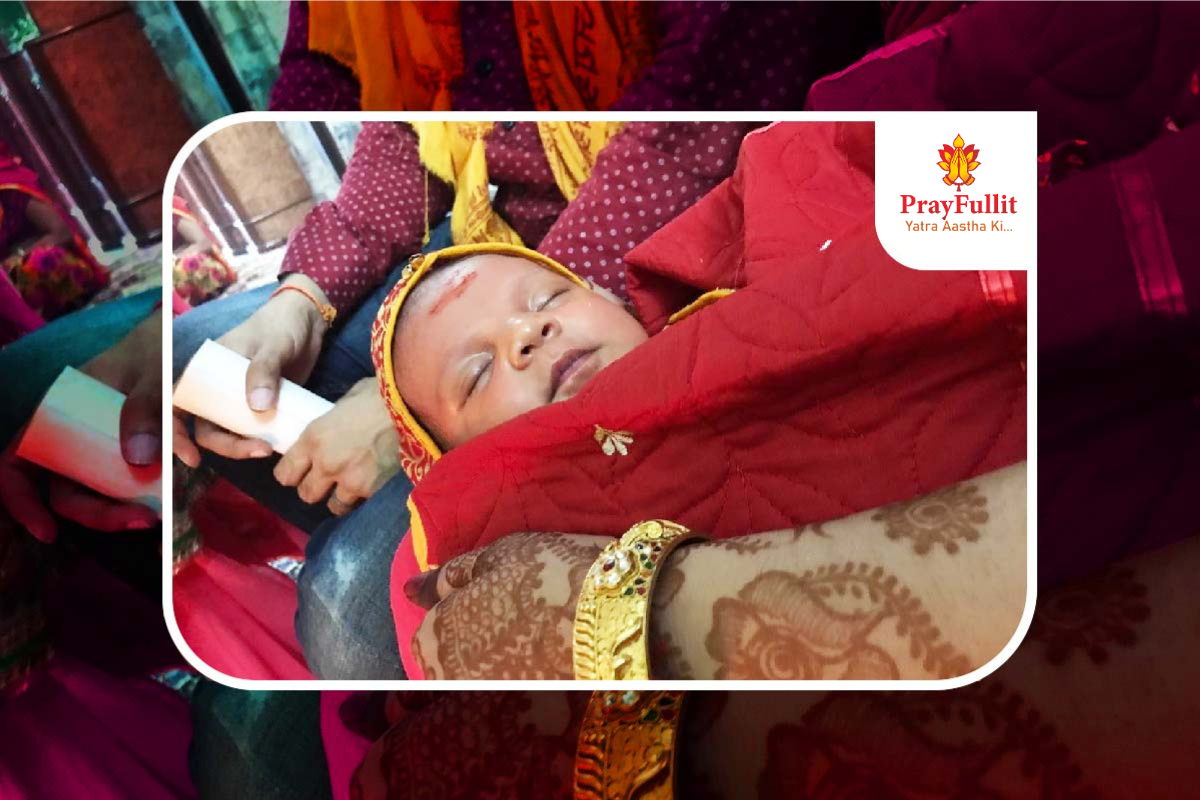Naamkaran Sanskar – Book Pandit for Newborn's Naming Ceremony
Naamkaran Sanskar is one of the most significant of the 16 Vedic Shodasha Sanskars. It is the formal naming ceremony where a newborn is introduced to the family, the community, and the Divine. In Hindu tradition, a name is not just a label; it is a carrier of energy and destiny. A name chosen according to Vedic astrology (Jyotish) is believed to align the child’s life with their cosmic purpose, influencing their character and future success.
At Prayfullit, we provide expert Vedic Pandits who visit your home to perform the Naamkaran ceremony. From calculating the auspicious Nakshatra letter to conducting the sacred Homa, we ensure your child’s first major milestone is marked with spiritual purity and joy.
The Significance of Naamkaran Sanskar
- Astrological Alignment: The child is named based on the Nakshatra (birth star) to ensure their name vibrates in harmony with their planetary positions.
- Spiritual Identity: Formally introduces the child to the family’s Kuldevta (lineage deity) for lifelong protection.
- Character Building: Bestowing a name with a virtuous meaning is believed to inspire the child to embody those qualities throughout their life.
- Purification: The accompanying Havan purifies the home environment, removing any post-birth "Sutak" (impurity) and inviting positive energy.
When to Perform Naamkaran Sanskar?
- Timing: Traditionally performed on the 11th or 12th day after birth. If missed, it can be performed on any auspicious day thereafter, as calculated by a Pandit.
- Shubh Muhurat: Our astrologers help you find the most favorable Tithi and Nakshatra to ensure the child receives the maximum cosmic blessings.
The Sacred Procedure of Naamkaran Sanskar
Our Pandits follow the authentic Vedic protocols at your home:
- Ganesha & Graha Pujan: Invoking Lord Ganesha and the nine planets to ensure a prosperous life for the newborn.
- Panchagavya Shuddhi: Ceremonial purification of the baby and the household.
- Havan (Fire Ritual): A sacred fire is lit to invoke Agni Dev, through which prayers are sent for the child’s longevity and health.
- Whispering the Name: The father or an elder whispers the sacred name into the baby’s right ear three times using a betel leaf or a gold ring.
- Rice Writing: The chosen name is often written in a tray of rice or sand, symbolizing a life filled with abundance.
- Blessing & Tilak: Elders apply a sacred Tilak on the baby’s forehead and shower the child with Akshat (sanctified rice) and flowers.
Preparation Checklist for the Naamkaran Sanskar
- Birth Details: Keep the exact date, time, and place of birth ready for the Pandit to confirm the Nakshatra.
- Samagri: Our Pandits provide a list including honey, ghee, new clothes for the baby, flowers, and sweets.
- Cleanliness: The home should be clean, and a small altar should be prepared in the Northeast corner.
- Feast: Prepare a Sattvic meal to be shared with family and the Pandit after the ceremony.
Why Choose Prayfullit?
- Expert Pandits at Your Doorstep: Verified Vedic scholars who visit your home to guide you through the complex naming rituals.
- Personalized Horoscope Support: Our Pandits help interpret the baby’s birth star to suggest the most auspicious starting letters.
- Guaranteed Authenticity: High-quality Samagri and precise mantra pronunciation for a truly spiritual experience.
- Cultural Integrity: We respect and follow your specific regional and family traditions.
- Effortless Booking: Secure a professional Pandit through our app or website in just a few clicks.
Book Your Naamkaran Sanskar Today with Prayfullit
Give your child a name that resonates with divinity and success. Our team at Prayfullit brings the wisdom of the Vedas to your doorstep, ensuring your child’s identity is forged with blessings and love.
Download the Prayfullit App
Manage your spiritual and business rituals with ease. Book verified Pandits for Home visits, perform online pujas, book temple darshan, consult experienced astrologers, check horoscopes, and offer chadava — all from one trusted platform.
